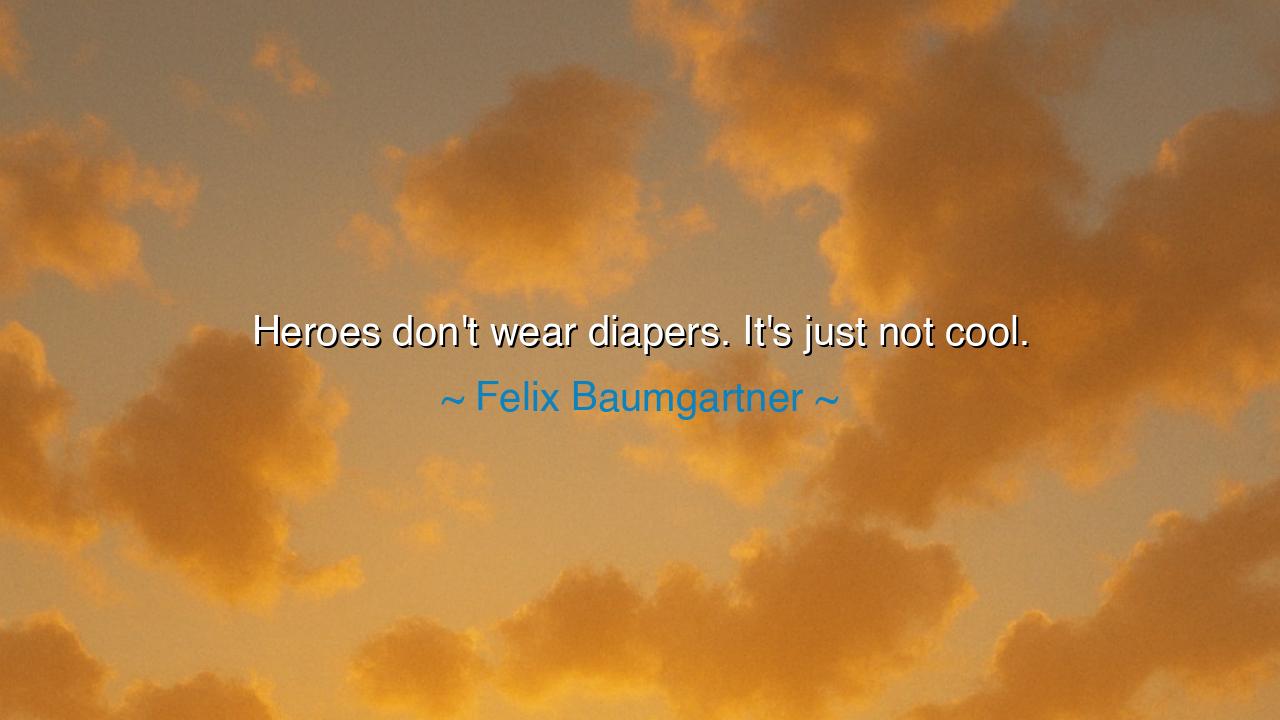
Heroes don't wear diapers. It's just not cool.






In a world where courage and boldness are often celebrated, Felix Baumgartner’s words, "Heroes don't wear diapers. It's just not cool," strike with a force that cuts through the superficial and speaks to the heart of true heroism. Baumgartner, the man who leapt from the edge of space, challenges the very notion of what it means to be brave. His words are a reminder that heroism is not about comfort, nor is it about avoiding the difficult, the painful, or the frightening. True heroes rise to face adversity without fear of the challenges before them, and certainly, without the crutch of ease or comfort.
The ancients understood this distinction well. Homer’s Iliad is filled with warriors who, though they faced the horrors of battle, did not seek to escape from their destiny or hide from danger. Achilles, the greatest of the Greek heroes, understood that to be a hero was to confront fear, death, and pain without hesitation. He did not wear the diaper of comfort or avoidance, for he understood that true heroism lies not in the avoidance of struggle, but in the ability to endure and overcome it. Baumgartner's words speak to this idea: heroism requires the bravery to face discomfort head-on, not hide behind any form of escape.
Throughout history, there have been many examples of heroes who have stood firm in the face of overwhelming odds. Leonidas, the Spartan king, and his 300 warriors faced the mighty Persian army with unwavering resolve. The hardships of battle, the knowledge of inevitable death, did not make them seek comfort or run from their fate. They stood, resolute and courageous, ready to face the end with honor. True heroism, as demonstrated by Leonidas and countless others, is not about seeking safety, but about stepping forward with bravery and integrity, willing to face any challenge, no matter how great.
Baumgartner’s words also remind us of the importance of personal responsibility. The hero is not one who seeks refuge or the protection of others but one who takes action, even when the path is treacherous. Nelson Mandela, after years of imprisonment, did not emerge as a man seeking ease, but as one who had endured suffering for the sake of a greater cause. His actions were not driven by the desire for comfort but by the unyielding belief in justice and equality. His struggle was not one of escape, but of embracing the hardships necessary to achieve something far greater than personal ease.
To wear diapers in this metaphorical sense is to seek comfort, to avoid the necessary struggles that are the very foundation of personal growth and achievement. True heroes face the world without hiding behind the protection of ease. The path of the hero is fraught with difficulties, yet it is through these challenges that greatness is achieved. Heroes are not made by avoiding discomfort but by embracing it and transcending it with unwavering determination and purpose.
The lesson here is one of courage and integrity. In our own lives, we will inevitably face moments where it would be easier to seek refuge in comfort, to avoid the discomfort of growth, or to shy away from challenges. But true heroism lies in the ability to face these challenges head-on, to lean into the discomfort rather than run from it. As Baumgartner reminds us, heroes don’t wear diapers; they face the world as it is, with all its struggles, and rise to meet it with strength and resilience.
In every life, there is a call to greatness. To answer that call is to embrace the discomforts, the challenges, and the inevitable struggles that come with it. Real heroism is not about avoiding difficulty, but about stepping into the fray with conviction and purpose. Let us not shrink from the challenges that come our way, but instead, let us lean into the future, face the discomforts, and rise to the occasion with the bravery of those who know that the path of the hero is one of strength and endurance, not avoidance.






AAdministratorAdministrator
Welcome, honored guests. Please leave a comment, we will respond soon